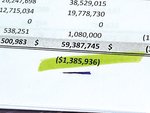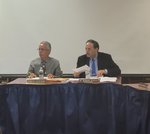



UPDATED
The Johnston School Department needs nearly $1.4 million to balance next year’s budget.
Last year, facing a similar situation, Johnston Town Council approved a tax hike.
How will Johnston balance the school budget this year?
“I’m not familiar with this since the school is independent from our side, but I’ll see it when they present their budget,” said mayoral candidate and Johnston Town Council Vice-President Joe Polisena Jr. “Whatever their final number is, I will not vote for any tax increase on the residents. It’s burdensome and unnecessary, particularly in today’s times of high inflation. Not happening.”
“The town appropriation remains the same,” Johnston Schools Superintendent Dr. Bernard DiLullo Jr. told the School Committee at their budget workshop on April 4. “We haven’t heard of an increase yet.”
The School Committee voted unanimously Tuesday night, April 12, “to accept the Proposed Johnston Public School Operating Budget for SY 2022-2023.”
The budget will now be sent to Town Council.
The school department’s proposed 2022-23 budget plans for $60,773,681 in total expenses (more than $15 million for operating expenses, and $45 million for salaries and benefits).
Rhode Island State Aid will likely cover $19,778,730 and the district expects around $1 million in “miscellaneous revenue.” The town’s appropriation toward the school budget is expected to be $38,529,015.
On Tuesday, April 5, a small portion (slightly more than 5 percent) of Johnston’s registered voters turned out to vote in a $215 million bond referendum to fund a transformative school building project in town.
Polisena Jr. and his father, Johnston Mayor Joseph M. Polisena, have both stated publicly that the tax burden will be “negligible” if voters approved the bond. It passed with approximately 86 percent of voters’ approval.
Last June, Polisena requested a 2.74 percent property tax increase and Town Council unanimously approved the hike.
It was the first property tax increase in Johnston since 2017.
The proposal increased taxes to $23.24 per $1,000 of assessed valuation for residential real estate, $28.34 per $1,000 of assessed valuation for commercial real estate and $64.34 per $1,000 of assessed valuation for tangible personal property.
At the time, Polisena said increases in “unavoidable” costs in the school budget were mostly responsible for the needed tax revenue.
“I have a responsibility that the school department gets what they need,” he said last June. “The school had put in a $1,600,000 increase, and we’re going to give them a million.”
This year, the district will request $1,385,936 to balance the budget.
Mayor Polisena has not returned calls and a text message requesting comment on a possible tax hike in his last year as mayor.
Town Council member Robert Civetti said he has yet to see a copy of the proposed budget.
“I would be happy to comment when I know more, but since I have not seen their proposed budget I cannot comment at this time,” he wrote last week via email.
Last June, Polisena said the school department was facing “rising costs beyond their control.” On Monday night, the DiLullo echoed the prior year’s budget hurdles.
In 2021-22, the rising educational costs included an 18.5 percent jump in health care expenses and about $3 million to cover students who travel outside of the district for schooling.
This year, inflated expenses from newly approved salary contracts and out-of-district tuition have pushed the budget into the red.
For regular education, the district expects to pay $2,583,000 on vocational tuition and $619,500 on charter school tuition (for a total of $3,202,500). That’s about $23,500 more than the school department requested last year.
For special education, the district expects to pay $3,373,977 ($448,919 more than requested last year).
“I think that this budget is probably as close to the bone as we could possibly ask for,” School Committee Member Joseph W. Rotella said to DiLullo at the budget workshop. “We know how hard you work on it. We really appreciate it. It’s just unfortunate that the out-of-district is so high. Because if the out-of-district wasn’t so high, you would be $3 million (ahead).”
“One of the things communities should know about out-of-district placements, especially in special education, is that the state determines the cost-per-pupil when they send the student out of district,” DiLullo explained. “So for example, we would get a letter from the DCYF that said they were placing student X in out-of-district placement. You are responsible to pay $110,000 for that student. So we have no control over that. They make that decision. DCYF makes that decision, sends the kid out, and then they send us a bill.”
“As of right now, I don’t really think there’s much more we can do,” Rotella said.
“Other than budget for it,” DiLullo responded.
Insurance costs also skyrocketed.
School Department Business Manager Lesli-Ann Powell told the committee that insurance rates have increased, mainly due to stricter cyber-security requirements.
“We were required this year to get cyber-security insurance,” she said.
School Committee Chairman Robert LaFazia broached the topic of staffing and deeper budget cuts.
“Right now, if we have to make any cuts whatsoever, what departments do you think we would have to look into?” LaFazia asked DiLullo.
“So, the salaries are the salaries … We would probably look at special education,” DiLullo answered. “Although that would be an unreasonable cut, because we want to make sure we have enough money there. Probably a little bit off transportation. We could do that. We certainly can go back and take a look at this, if we want to have another meeting.”
LaFazia asked how this year’s special education matched up to budgeted expenses.
“Were we pretty much in line? Did we go over?” He asked.
“We are actually, if we look at what we’ve encumbered right now, year-to-date, we’re going to go over our budget because of the out-of-district tuition,” Powell said. “And that’s the only reason. Everything else is in line.”
LaFazia made a motion to put the budget proposal on the School Committee meeting agenda for Tuesday, April 12. The proposed budget was unanimously approved Tuesday.
“Send it down to Town Hall, and take it from that point on … We’re kind of like hand-cuffed … unless we can make some large cuts,” LaFazia said. “It’s almost impossible to come up with that million.”
“When you look at our year-to-date budget, budget to actual, most of our expenses are below what we budgeted for with the exception of things like out-of-district placement, special education, overtime, and then of course, benefit costs are always a moving target,” DiLullo said.
“Did we freeze everything?” LaFazia asked.
“We’re frozen right now,” Powell responded, adding that there’s “not a single department that’s over 60 percent of their spending right now. There’s no over-spending.”
Comments
No comments on this item Please log in to comment by clicking here